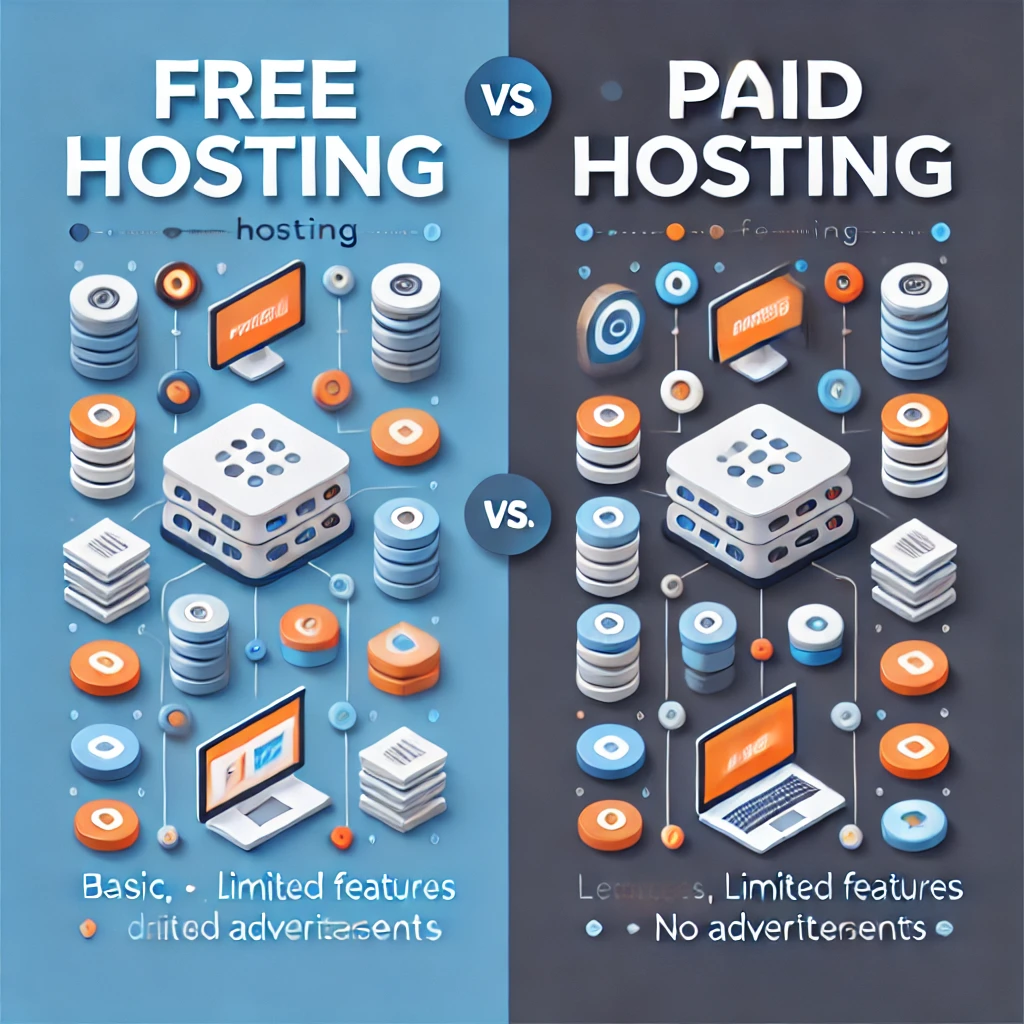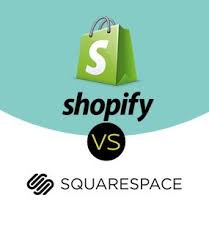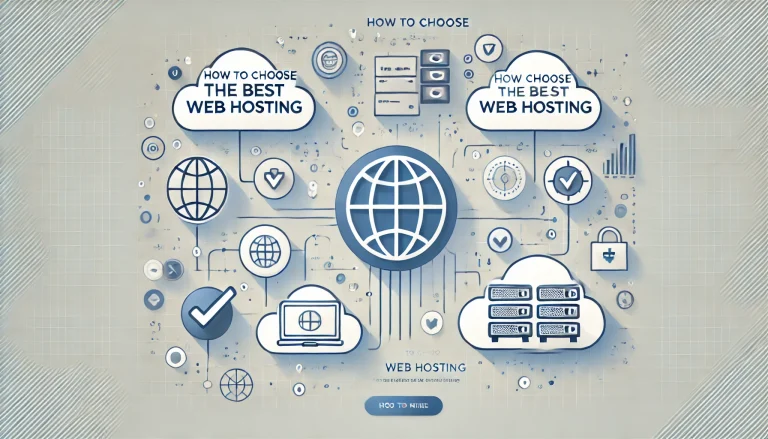Free Hosting vs. Paid Hosting: Making the Right Choice for Your Website
In the digital age, establishing an online presence is crucial for businesses, bloggers, and professionals. One of the first decisions you will need to make when creating a website is choosing between free hosting and paid hosting. Each option has its unique advantages and disadvantages, which can significantly impact your site’s performance, security, and scalability. This comprehensive guide will delve into the differences between free and paid hosting to help you make an informed decision.

Table of Contents
Understanding Free Hosting
Free hosting is a service provided by hosting companies that allow users to host their websites without any financial investment. This type of hosting is ideal for beginners, hobbyists, or those on a tight budget who want to experiment with website creation and management.
Advantages of Free Hosting:
- No Cost: The most significant advantage is that it’s free, making it accessible for everyone.
- Ease of Use: Many free hosting services come with user-friendly tools and website builders.
- No Commitment: You can start a website without any long-term financial commitment.
Disadvantages of Free Hosting:
- Limited Resources: Free hosting plans often come with restrictions on storage, bandwidth, and features.
- Advertisements: Hosting companies often place ads on your website to cover the cost of free hosting.
- Lack of Support: Customer support is typically limited or non-existent.
- Subdomain: You usually don’t get a custom domain name and must use a subdomain provided by the host.
Top Free Hosting Providers
InfinityFree
Offers unlimited storage and bandwidth, but the performance may vary during high traffic periods.
000WebHost
Managed by Hostinger, known for its reliability but includes a daily hour of downtime.
AwardSpace
Provides an ad-free experience but with slower server response times.
FreeHosting.com
Generous features but lacks MySQL databases in the free plan.
ByetHost
Offers decent performance with a free SSL but limited CPU usage.
Understanding Paid Hosting
Paid hosting requires a financial investment but offers significantly more in terms of resources, performance, and support. It is suitable for businesses, professional bloggers, and anyone looking to scale their website.
Advantages of Paid Hosting:
- Enhanced Performance: Paid plans generally offer better speed and uptime.
- More Features: Increased storage, bandwidth, and additional functionalities such as email accounts and databases.
- Professional Support: Access to 24/7 customer support.
- Custom Domain: You can use a custom domain name without ads.
Disadvantages of Paid Hosting:
- Cost: There is a financial commitment involved.
- Complexity: Might be more complex to set up and manage for beginners.
Free Hosting vs. Paid Hosting: Detailed Comparison
Performance and Reliability
Paid hosting typically offers superior performance and reliability compared to free hosting. With paid hosting, you can expect faster load times, higher uptime guarantees, and more robust infrastructure. Free hosting, on the other hand, often suffers from slower speeds and more frequent downtime.
Resource Allocation
Free hosting plans come with significant limitations on storage, bandwidth, and other resources. This can be restrictive if your site experiences growth or requires more resources. Paid hosting plans offer scalable resources, allowing your website to grow without limitations.
Customer Support
Customer support is a critical factor in hosting services. Paid hosting providers usually offer 24/7 customer support through various channels, including live chat, email, and phone. Free hosting, however, often lacks reliable support, leaving you to troubleshoot issues on your own.
Advertisements and Branding
One of the main drawbacks of free hosting is the presence of advertisements on your website. These ads can detract from the user experience and appear unprofessional. Paid hosting plans do not have this issue, allowing you to maintain a clean, ad-free website.
Domain and Professionalism
Free hosting typically requires you to use a subdomain (e.g., yoursite.freehost.com), which can appear less professional. Paid hosting allows you to use your custom domain (e.g., yoursite.com), enhancing your site’s credibility and branding.
Security Features
Security is paramount for any website. Paid hosting providers offer advanced security features, including SSL certificates, regular backups, and malware scanning. Free hosting services may not provide these security measures, leaving your site vulnerable to threats.
Which Should You Choose?
Choosing between free and paid hosting depends on your specific needs and goals. Here are some scenarios to help you decide:
When to Choose Free Hosting:
- Learning and Experimentation: If you are new to website building and want to learn the ropes without any financial investment.
- Hobby Sites: For personal projects or hobbies where performance and professionalism are not critical.
- Budget Constraints: If you are on a tight budget and need a temporary solution to get started.
When to Choose Paid Hosting:
- Business Websites: For professional websites where performance, reliability, and support are crucial.
- Growing Websites: If you anticipate significant traffic growth or need more resources.
- E-commerce Sites: When you need advanced features, enhanced security, and a professional domain for online transactions.
Optimizing Your Hosting Choice
Regardless of whether you choose free or paid hosting, here are some tips to optimize your website’s performance:
1. Regular Updates
Keep your website’s software, plugins, and themes updated to ensure security and optimal performance.
2. Optimize Images
Use tools to compress and optimize images, reducing load times and improving user experience.
3. Leverage Caching
Implement caching mechanisms to improve load times and reduce server load.
4. Use a Content Delivery Network (CDN)
A CDN can enhance your website’s speed by distributing content across multiple servers worldwide.
5. Monitor Performance
Regularly monitor your website’s performance using tools like Google Analytics and PageSpeed Insights to identify and address issues promptly.
FAQs
Is free hosting suitable for a business website?
While it is possible to use free hosting for a business website, it is generally not recommended due to limitations in resources, performance, and professionalism. Paid hosting offers better reliability and features suitable for business needs.
Can I switch from free hosting to paid hosting?
Yes, many hosting providers offer easy migration tools to switch from a free plan to a paid plan. It’s advisable to check with your hosting provider for specific migration options.
Are there hidden costs in free hosting?
Free hosting services may include additional costs for premium features, extra storage, or domain registration. Always review the terms and conditions to understand any potential charges.
How does customer support differ between free and paid hosting?
Customer support in free hosting is often limited or non-existent, whereas paid hosting typically offers 24/7 support through various channels, ensuring prompt assistance when needed.
What security features are available in paid hosting?
Paid hosting plans usually include advanced security features such as SSL certificates, regular backups, malware scanning, and firewall protection, which are essential for safeguarding your website.
Can free hosting handle high traffic?
Free hosting plans often struggle with high traffic due to limited resources and bandwidth. For websites expecting significant traffic, paid hosting is recommended to ensure consistent performance and reliability.
Conclusion
In conclusion, the choice between free hosting and paid hosting depends on your specific needs, goals, and budget. Free hosting offers a cost-effective way to start a website, especially for beginners and hobbyists, but comes with significant limitations. Paid hosting, on the other hand, provides enhanced performance, reliability, support, and features, making it a better choice for professional and growing websites. By carefully evaluating your requirements and understanding the pros and cons of each option, you can make an informed decision that best suits your online presence.






